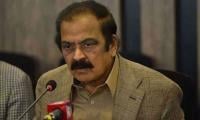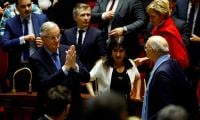During his recent visit to Karachi, Prime Minister Imran Khan had asked the Sindh government to continue running the Jinnah Postgraduate Medical Centre (JPMC), the National Institute of Cardiovascular Diseases (NICVD) and the National Institute of Child Health (NICH), saying that the federal government could not run them.
Sindh Chief Minister Syed Murad Ali Shah said this on Monday morning as he spoke to the media after starting a seven-day anti-polio drive by administering oral polio vaccines to children at a rural health centre in Baldia Town.
“During our discussions, the prime minister said he knew how difficult it was to run a hospital, therefore, the provincial government should run these three hospitals,” the CM said.
Shah claimed that he had discussed with the PM the issue of the possible transfers of the three hospitals to the federal government during the latter’s last visit to the city. “The prime minister said he was well aware that how difficult it was to run a hospital, therefore he gave me go-ahead to control these three hospitals.”
The CM said he had given two options to the federal government. “As per the first option, the federal government can give these three hospitals on the pattern of public-private partnership mode to the Sindh government. The option number two is to hand over these hospitals to the provincial government with financial and administrative control but keeping their ownership by itself.”
He added that he would also have no objection to the federal government controlling and operating the NICVD, JPMC and NICH but in that case, he would demand that the Centre return all the money that the Sindh government had invested in the health facilities since 2011.
Anti-polio campaign
Responding to a question about the increase in the polio cases, the CM said some issue had emerged related to the anti-polio vaccine in Khyber-Pakhtunkhwa, which had affected the anti-polio drive in Sindh as well and the provincial government we could not launch an anti-polio campaign last March. “The recent increase of 19 cases in 2019 is the result of that stalemate, otherwise, we had controlled the polio and we had only one case in 2017,” he said.
He added that during 2020 so far, five polio cases had been detected. “This is seriously a painful development for me because I have been making efforts to control it but so far negative results have come up.”
He maintained that as per the new strategy, local bodies, civil society and parents would be involved to save our future generations from the crippling disease.
“This is the question of our children – parents must decide whether they want to give healthy future to their children or disability for whole life,” he remarked and urged the parents all over Pakistan, particularly in Sindh, to show responsible attitude by administering anti-polio drops to their children.
The CM said 2.3 million children would be targeted in the seven-day campaign and another campaign would start on February 17 in other districts of the province with a target of 6.7 million children.
Shah urged the parents to administer anti-polio drops to their children at hospitals if they missed the drops during the drive. He also thanked to the 13,000 workers participating in the drive along with law enforcement agencies’ personnel who were providing them security. “All this is being done for the betterment of our children,” he said.
Replying to another question, the CM said the local bodies had to start a drive against stray dogs. “I have given them instructions to start a special drive and save people, particularly the children from dog bites.”
To a point raised by a resident of Baldia Town, the CM directed the health department to complete the under-construction 100-bed hospital as soon as possible. The health secretary told the CM that the facility would have all necessary facilities, including availability of gynaecologists. Shah vowed to personally monitor the completion of the hospital.
Responding to another question, Shah said his meetings with the governor were a routine affair. “We have been meeting off and on and there was nothing new in our meeting,” he said.
On the issue of the transfer of the Sindh inspector general of police (IGP), the CM said he had sent five names to the federal government for the new IGP. “The removal of the IGP was the decision of the cabinet,” he said and added that the ball was now in the court of the federal government and the delay in the posting of a new IGP was beyond his understanding.
Sindh Health Minister Dr Azra Pechuho, Health Secretary Zahid Abbasi and Karachi Commissioner Iftikhar Shallwani were also present on the occasion.
A provincial subject
To present the Sindh government’s stance on the issue of the ownership of the NICVD, JPMC and NICH, Adviser to the Sindh CM on Law and Sindh Government Spokesperson Barrister Murtaza Wahab addressed a press conference on Monday at the committee room of the Sindh Assembly.
He said health was a provincial subject and after taking over three federal hospitals in 2011, the Sindh government had spent billions of rupees on the three facilities to provide high-quality health care to the people.
“Due to the spending of billions of rupees by the provincial government, these health institutions have become state-of-the-art health facilities. Although we respect the Supreme Court of Pakistan’s ruling on the issue of the three Karachi hospitals, we beg to differ from the decision,” Wahab said.
He maintained that despite the court order, the federal government did not allocate a single rupee in the budget to run these three hospitals but still the Pakistan Tehreek-e-Insaf (PTI) leaders continue to claim on a daily basis that they would be running the hospitals.
The law adviser said the federal cabinet had decided in June 2019 that the Centre would not be able to run the three hospitals as effectively as the Sindh government had been running them but later, MPAs of the PTI in the Sindh Assembly visited the NICVD and told the people there that they would be running those health facilities.
“PTI leaders and lawmakers should understand that a political party and the provincial and federal governments are two separate things. The government institutions are run by the authorities, not the political parties,” he observed and added that PTI lawmakers should also realise that those health institutions had been transformed into modern health facilities after they were devolved to the Sindh government.
Advising the PTI lawmakers to go through the law and Constitution of Pakistan, Wahab said they should refrain from issuing baseless statements.
He said the National Accountability Bureau (NAB)’s notice to Pakistan Peoples Party (PPP) Chairman Bilawal Bhutto Zardari was a bid to silence him and prevent him from raising people’s issues. The PPP would continue to raise voice over price hike and crisis of gas and water in the country, he added.
Doctors warn of strike
With the CM claiming that the federal government was not interested in running the JPMC, NICVD and NICH, some senior faculty members and young doctors of the JPMC held a news conference on Monday and warned of strong protests and boycott of their duties if they were not taken into confidence before the transfer of their institute to the federal government.
They said the Joint Action Committee (JAC) of the JPMC should be engaged in negotiations before deciding the fate of the health facility.
They also raised concern over the possible demotions of some doctors and faculty members in case the Centre took over the JPMC.
“Professors and doctors of the JPMC are not against handing this institution back to the federal government but this is being done without taking us into confidence. A Departmental Promotion Committee (DPC) has been formed to decide the promotions of the senior faculty members, which would demote them into their previous grades, which is unacceptable,” said Prof Shahid Rasool, professor of surgery at the JPMC. He was accompanied by Prof Iqbal Afridi, Prof Sameer Qureshi, Prof Sughra Perveen, Pakistan Medical Association’s Dr Pir Manzoor, Dr Atif Hafeez of the Pakistan Islamic Medical Association and Dr Umer Sultan of the Young Doctors’ Association (YDA).
Prof Rasool, who is also a member of the JAC, said after the 18th constitutional amendment, JPMC and two other hospitals were handed over to the Sindh government but since then, they were deprived of their due rights including promotions and other facilities.
“Due to legal proceedings following the devolution, promotions of the staff and new inductions were stopped, creating a crisis like situation at JPMC which created problems for the staff as well as the patients,” he said and demanded of the federal and provincial governments to take the doctors into confidence before handing the JPMC’s control over to the federal government.
“We want the constitution of a negotiating committee which should take into account concerns and issues of the faculty as well as young doctors. If our demands are not met, we would observe token boycott from Thursday and then go to boycott of OPDs from Monday,” said Dr Sultan, the chairman of the YDA Sindh.
He said postgraduate trainees and medical officers of the Sindh government deserved to be absorbed in the JPMC as they had served there for last several years.
A general aerial view of a commercial district in Karachi. — AFP/FileCultural BlossomsThe ArtCiti gallery is hosting...
A launching ceremony of the book titled 'The Later’ at the Canvas Gallery on December 4, 2024. — Screengrab via...
This File photo shows PNS Ghazi . — Facebook@farrukh.ismail.90/File December 4 – reminiscent of the unfortunate...
Rangers personnel escort Peoples Aman Committee chief Uzair Baloch from a court in Karachi. — AFP/FileAn...
Sindh CS Syed Asif Hyder Shah along with ACP President Muhammad Ahmed Shah visit after inaugurating the exhibition...
View of the KE headquarters in Karachi. — Facebook@K-Electric/FileThe Sindh High Court on Wednesday suspended...







